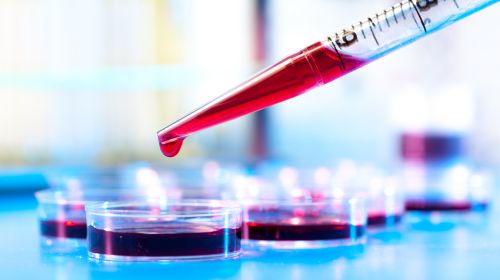Author: Monika Preuk, medical writer
Last update:
December 08, 2020
The creatinine value (also known as the Krea value) shows whether the kidneys are healthy. The cause of an increased creatinine level can be the intake of creatine as a dietary supplement. It's popular with strength athletes – but it's not safe.
- The creatinine concentration is usually determined with a blood test.
- © iStock.com/Damerau
Creatinine is a breakdown product of creatine, the energy store of muscle cells. Up to two percent of creatine is excreted as creatinine through the kidneys and urine every day.
At a glance:
Why is the creatinine level determined?
The creatinine value (abbreviation: KREA or Krea value) belongs to the kidney values in addition to that for urea and the glomerular filtration rate (GFR). It is determined to check the function of a patient's kidneys, for example if kidney damage or chronic kidney disease are suspected.
In the case of a number of diseases, the parameter is regularly determined to control therapy. These include diabetes and high blood pressure (hypertension). The value should also be checked regularly when taking medication that can damage the kidneys.
Contrast agent and kidney value
A current value must also be available for certain imaging procedures in which contrast media are used. This may be necessary for an MRI, a CT or an X-ray examination, for example. The reason: the contrast media are usually injected intravenously and are seldom drunk. They serve to make body tissue more visible and to be able to differentiate it from one another. Since the funds are broken down via the kidneys and the urine excreted, it must be ensured that the organ is working properly by determining the Krea value before such an examination.
What does creatinine clearance mean?
The Krea value only shows a change if the kidney function deteriorates by more than 50 percent. It is therefore only a very rough guide and only allows statements to be made about kidney function in the event of large deviations from the reference value. Therefore, if an incipient renal insufficiency is suspected, the creatinine clearance is often determined. This is a measure of how much creatinine the human kidney can excrete in a given time. In order to determine the creatinine clearance, experts in the laboratory determine how much blood plasma the kidneys "clear" of creatinine.
The value is very sensitive when it comes to determining impairments in kidney function at an early stage. However, the creatinine clearance measurement is complex: It consists of a blood sample and the collection of the urine excreted over a day, the so-called 24-hour urine. Because this procedure is very complex and error-prone, nowadays kidney filtration is usually measured with the GFR instead.
How is the creatinine level determined?
Usually the value is determined in the blood, in the blood plasma or in the serum. Only the creatinine clearance also requires the collection of 24-hour urine.
Creatinine is also excreted in the urine via the kidneys. The kidneys excrete around 1.2 to 1.8 grams of creatinine per day.
In which range are the normal values?
The normal value for crea (measured in the blood) varies widely, depending on age, gender and muscle mass. The following values serve as a guide, it is measured in milligrams per deciliter (mg / dl) or in micromoles per liter (µmol / l).
| Unit of measurement | mg / dl | µmol / l |
| Men | between 0.5 and 1.1 (higher values in old age) | 44 to 97 |
| Women | between 0.5 and 0.9 | 44 to 80 |
What are the causes of increased creatinine levels?
If the creatinine concentration in the blood is too high, poor kidney function may be the cause. Because the level in the blood rises as soon as the excretion via the urine no longer works properly.
Blood or fluid loss can also increase the value. Inflammation and injuries to the muscles and skin can cause the value to be too high.
In addition, taking creatine as a dietary supplement, for example to improve performance in weight training, naturally increases the creatinine levels in blood and urine.
What are the reasons for a creatinine level that is too low?
Too little creatinine in the blood has no medical significance. Pregnant women, children and people who are underweight in particular often have low Krea values.
What does creatine do for muscle building?
In addition, creatine, the starting material for creatinine, plays a role for athletes. Because the organic acid helps to store water in the muscles and partially supports muscle building. In addition, it can improve performance. Many amateur athletes who want to achieve more strength and endurance in a short time therefore rely on the dietary supplement.
It is not considered a doping agent and is therefore not prohibited in competitive sports. However, if you overdo it, you will have muscle cramps. Natural sources of creatine are herring, salmon, tuna, pork, and beef.


